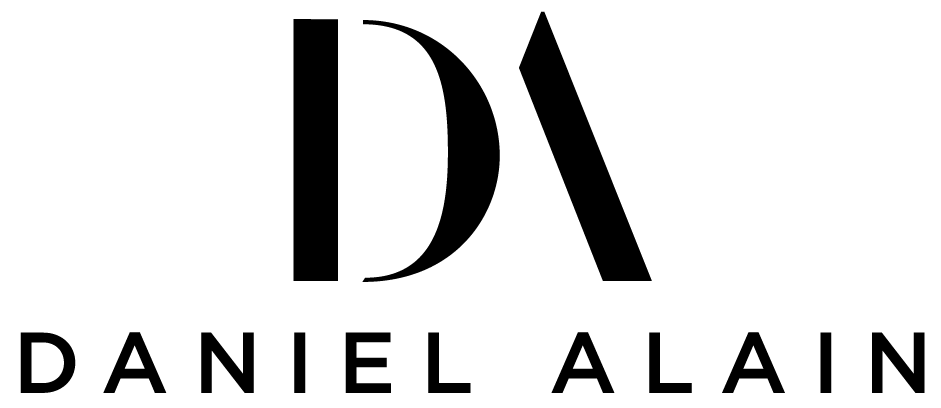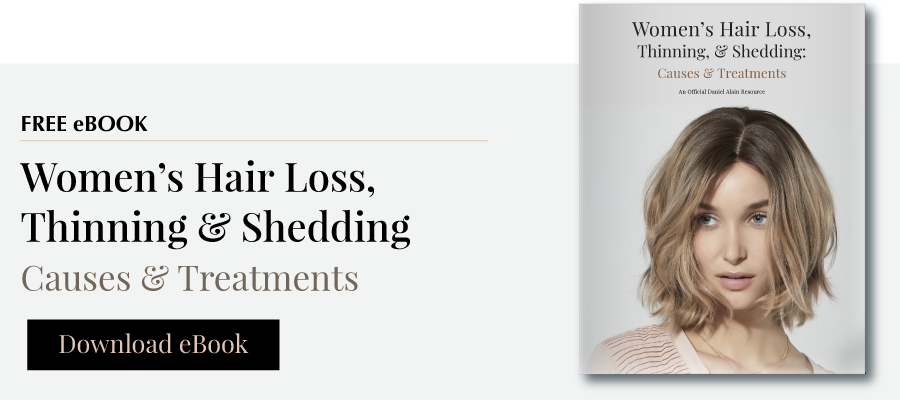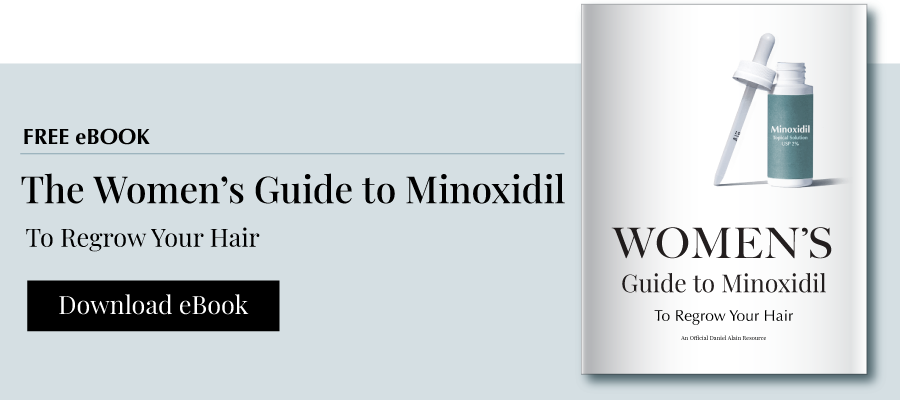What Vitamin Deficiencies Cause Hair Loss?

Stressing over a sudden onset of hair loss or shedding? A lack of nutrients could be the culprit behind your tress distress — but which vitamin deficiencies cause hair loss? That’s what we’re here to talk about today.
Losing hair is never fun, but when it happens, it’s often our body’s way of alerting us that something is happening underneath the surface. There are many reasons for male and female hair loss, but one of the most common causes is vitamin deficiency.
A deficiency happens when our bodies don't get enough of certain essential vitamins and minerals. This can lead to a range of health issues, including hair fall. To maintain healthy hair and overall well-being, getting all the nutrients our bodies need to look and feel their best is vital.
In this article, we’ll dive into the most common vitamin deficiencies that can lead to hair loss and explore the various treatment options available. Whether you're looking to prevent hair loss or restore your hair’s vitality, we've got you covered.
Ready to learn which vitamin deficiencies cause hair loss and what you can do to get ahead of it? Keep reading!
Vitamin Deficiencies That Can Cause Hair Loss
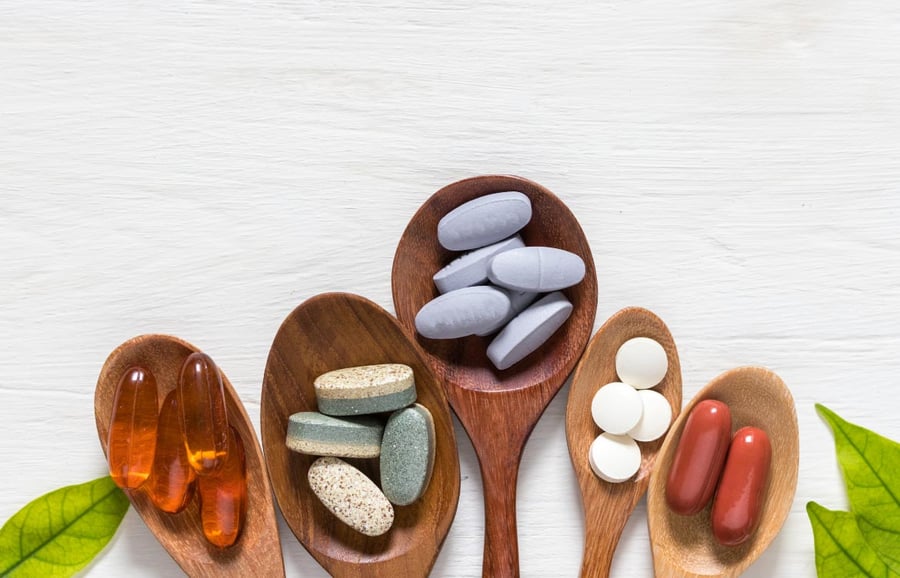
It's completely natural to feel frustrated and even helpless when faced with sudden hair fall. The good news is vitamin deficiency and hair loss is often reversible once the deficiency has been addressed.
These deficiencies can arise for various reasons, from dietary restrictions and medical conditions to certain medications and lifestyle factors. By understanding which vitamins are most important for strong, healthy hair and how to address any deficiencies, you can take control of your hair health and reclaim your confidence.
So without further ado, let's discuss which vitamin deficiencies often cause hair loss.
Vitamin B12
Vitamin B12 (also known as cobalamin) is an essential nutrient for the proper functioning of the brain and nervous system and the production of red blood cells. Red blood cells help carry oxygen through all the cells in your body, including your hair.
Like other vitamin deficiencies that cause hair loss, a lack of B12 can result in anemia, which is associated with low iron levels, a vegan diet that doesn’t implement B12 supplementation, hair thinning, and hair loss.
Biotin
Biotin is one of the first nutrients that comes to mind when discussing hair loss and vitamin deficiencies.
Your body uses biotin (vitamin B7 or vitamin H) to metabolize fats, carbohydrates, and amino acids. It also helps your body produce keratin, the protein and main structural component of hair, skin, and nails.
As such, a biotin deficiency can halt your keratin production, resulting in skin rashes, brittle nails, hair thinning, or hair loss.
Riboflavin
Like biotin, riboflavin (vitamin B2) helps metabolize carbs, fats, and proteins. It’s also involved in the metabolism of iron, which is essential for producing red blood cells and collagen.
Collagen is the most abundant protein in your body and is responsible for supporting the structure of your skin, muscles, bones, and connective tissues.
Riboflavin vitamin deficiencies, which are rare, cause hair loss and reproductive issues.
Folate (Folic Acid)
Folate, also known as vitamin B9 or folic acid, is important for synthesizing and repairing DNA, supporting red blood cell production, and metabolizing nutrients.
You’ll often see folate in prenatal vitamins, as it’s an essential nutrient for healthy fetal development during early pregnancy.
Folate stimulates hair growth because it helps regenerate new cells. Premature graying and hair loss due to folate vitamin deficiencies aren’t uncommon when lacking this nutrient.
Iron
Iron is an essential mineral that supports various bodily functions, including red blood cell production, oxygen transport, and collagen synthesis.
Iron is one of the main nutrients brought up regarding which vitamin deficiencies cause hair loss. That’s because iron deficiency affects over 1.2 billion people worldwide.
Iron deficiency often leads to anemia (a condition where the body doesn’t have enough red blood cells), causing symptoms such as fatigue, weakness, shortness of breath, and in severe cases, hair thinning, loss, or stunted growth.
Zinc
Zinc helps support your immune system, wound healing, taste, smell, and vision. It’s also important for metabolizing several nutrients and synthesizing DNA and RNA.
Regarding vitamin deficiencies that cause hair loss, zinc deficiencies aren’t as common in more developed countries. Still, they can occur in individuals with poor diets or certain medical conditions (such as malabsorption syndromes or chronic alcoholism). Symptoms include diarrhea, a decreased sense of taste and smell, and telogen effluvium or brittle hair.
Selenium
Selenium is a trace mineral that supports immune and thyroid function, as well as fertility. It also produces antioxidant enzymes, which protect your body's cells from free radical damage.
A selenium vitamin deficiency and hair loss relate in two ways.
First, insufficient selenium in the body means the cells in your hair follicles may become damaged, leading to hair loss. It can also decrease immune function, which also contributes to hair loss.
Vitamin E
Vitamin E is a fat-soluble vitamin necessary for boosting the immune system and maintaining healthy skin, hair, and nails. It’s also an antioxidant that helps keep your body's cells safe from free radical damage.
When it comes to hair loss and vitamin deficiencies, we often forget the importance of scalp health. That’s where vitamin E comes in.
This nutrient creates a protective barrier for your scalp, keeping your hair hydrated, healthy, and happy. It also helps your body reduce oxidative stress on the scalp, a common cause of hair loss.
Vitamin C
Also known as ascorbic acid, vitamin C is a powerful antioxidant for helping your body absorb zinc and helps ward off hair loss. It’s also great for ramping up collagen production and boosting overall health.
Hair loss due to vitamin C deficiencies isn’t uncommon because of how much the nutrient contributes to healthy hair growth.
Fatty Acids (Omega-3)
Fatty acids, or Omega-3 fatty acids, are polyunsaturated fats that support your immune system, heart health, brain function, skin, nails, and hair.
Vitamin deficiencies, such as fatty acids, cause hair loss which can present on the scalp or eyebrows. This results from decreased immune function and reduced collagen production brought about by not having enough of this vital nutrient.
Amino Acids
Amino acids are considered the building blocks of proteins within the body. They support the growth, repair, and maintenance of tissues such as skin, hair, and nails.
There are 20 different amino acids that your body uses to make proteins grouped into three categories: essential, nonessential, and conditional.
Essential amino acids aren’t produced naturally and must be obtained through a balanced diet. Nonessential amino acids can be made by the body, and conditional amino acids are only necessary under special circumstances, such as illness or injury.
When your body has sufficient amino acids, it helps protect your locks from sun damage, boosts collagen production, and strengthens your hair.
In rare cases, a lack of amino acids in the body can result in vitamin deficiencies that cause hair loss.
OTHER WAYS YOU CAN CONTROL HAIR LOSS
Knowing which vitamin deficiencies cause hair loss is a great starting point, but if altering your nutrition hasn’t delivered the results you expected — don’t feel discouraged. The bottom line is that vitamin deficiencies are only one of a plethora of hair loss causes.
At Daniel Alain, we offer a diverse range of scientifically-proven hair solutions that promote regrowth and combat hair loss. These more intensive options can provide excellent results for those struggling with significant hair loss.
If you’re tired of letting hair loss hold you back, consider one of the following hair solutions:
Take a Minoxidil Response Test to See if it Will Regrow Your Hair

Minoxidil is the only FDA-approved hair-regrowth drug for men and women.
Applied topically, Minoxidil dilates the blood vessels in your scalp to receive the oxygen and nutrients that trigger hair growth. As a result, it prolongs the anagen (or growth) phase of your hair growth cycle.
However, Minoxidil only succeeds if you have enough Sulfotransferase (SULT1A1) enzymes to be effective. To be sure, you must take the Minoxidil Response Test for Men or the Minoxidil Response Test for Women.
After submitting a few hair strands to our CLIA-certified lab, our scientists will determine if Minoxidil will work for you.
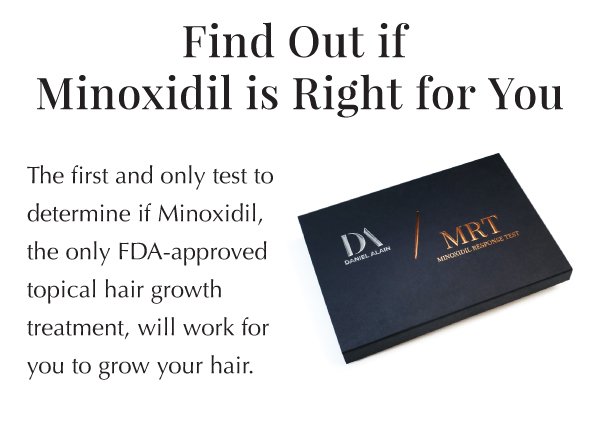
Use INTACT Anti-Hair Shedding Treatment

Unfortunately, it can take several months to see results when tackling vitamin deficiencies that cause hair loss.
The INTACT Anti Hair Shedding Treatment hits fast forward on hair fortification, delivering results instantaneously.
The secret lies in our patented PiliLock® Sevilla Orange Complex, which targets excessive hair shedding and literally locks your hair into the root.
Why wait months for strong, healthy hair when you can achieve it in 30 minutes with INTACT?
Wear a Human Hair Wig or Topper

If you’re struggling with severe hair loss, human hair wigs and toppers are excellent options for quick, natural-looking solutions that instantly upgrade your confidence.
Whether you’re getting impatient waiting for your vitamin deficiency and hair loss to balance out or simply want to experiment with a new look — our artfully-crafted human hair wigs and toppers come in a range of styles to fit your aesthetic, so you always feel like your most gorgeous self.
And if you think you have to sacrifice quality for variety, think again.
Daniel Alain’s premium European wigs and toppers are designed with 100% human hair that replicates the appearance, texture, and bounce of beautiful, natural tresses. The result? Hair that looks and feels virtually indistinguishable from your own.
Not sure where to start? Our Ultimate Wig Buying Guide will help you shop for the perfect wig or topper with confidence.
Download the Ultimate Wig Buying Guide
FIND A SOLUTION FOR HAIR LOSS AT daniel alain
If you’re overwhelmed with hair loss, you don’t have to face it alone.
At Daniel Alain, we’re committed to empowering you on your journey toward beautiful hair and unyielding confidence. We understand that hair loss is a difficult and emotional experience, so we’re proud to offer safe, affordable, clinically-proven solutions tailored to your needs.
It’s time to stop letting hair loss derail your confidence. Turn to the experts at Daniel Alain and take one step closer to achieving your dream hair!
- Take control of your hair and get personalized guidance from our hair experts by booking a consultation today.
- When it comes to hair, knowledge is power. Visit our hair loss learning center to explore additional resources.
- Rather visit us in person? Plan a trip to one of our authorized retailers and learn about our hair solutions face-to-face.
book a free consultation
Our stylists will help you find the right hair loss solution just for you

Frequently Asked Questions
What Vitamin Stops Your Hair From Falling Out?
There are many vitamin deficiencies that cause hair loss.
Some of the most common include:
- Vitamin B12
- Biotin
- Riboflavin
- Folate
- Iron
- Zinc
- Selenium
- Vitamin E
- Vitamin C
- Folic Acid
- Fatty Acids
- Amino Acids
Check with your doctor to determine which nutrients your body might be lacking.
Can Vitamin Deficiency Hair Loss Grow Back?
Often, yes. Vitamin deficiency hair loss can be reversible if the underlying deficiencies are addressed and corrected. However, the rate of hair regrowth can vary depending on the severity and duration of the deficiency, as well as a person’s age and overall health.
What Does Vitamin-Deficient Hair Loss Look Like?
Vitamin deficiency hair loss can present in different ways, depending on the specific deficiency and other factors such as genetics, medical conditions, and lifestyle.
Some common signs of vitamin deficiency hair loss include:
- Thinning hair
- Excessive shedding
- Dry, brittle strands
- Dry scalp
- Changes in hair color or texture
Why Am I Suddenly Losing So Much Hair?
There can be many reasons for sudden hair loss.
Some of the most common causes are:
- Telogen effluvium (or stress hair loss)
- Hormonal imbalances
- Pregnancy
- Medications and medical conditions
- Radiation
- Genetics
- Aging
- Menopause
- Diet and nutrition
- Traction alopecia
The best way to determine the root of your hair fall is to consult your healthcare provider.
What is the Main Reason for Hair Loss?
There are many potential reasons for hair loss — one of the most common being vitamin deficiency (a nutrient imbalance).
How Can I Stop Hair Fall Immediately?
Stopping hair fall immediately depends on why it’s happening in the first place.
If a vitamin deficiency is causing your hair loss, the first step is to supplement your body with the essential nutrients it's lacking.
Incorporating an anti-hair-shedding treatment, like INTACT, is another excellent way to instantly fortify your hair while addressing any underlying conditions causing hair fall.
Can Low Iron Cause Hair Loss?
Yes — an iron deficiency can trigger hair loss.
Iron is an essential nutrient for carrying oxygen to the cells in your body, including those in hair follicles. When your body doesn’t get enough iron, it can slow down your production of red blood cells, which can cause anemia.
Anemia forces your hair into the telogen (resting) phase earlier than normal, resulting in excessive shedding and hair thinning.
Can Low Vitamin B12 Cause Hair Loss?
Yes — Like iron, vitamin B12 is vital for supporting red blood cell production and its ability to carry oxygen throughout the body, including your scalp.
Therefore, a B12 deficiency could result in a decrease of oxygen to the scalp meaning your hair follicles may not be able to sustain hair regrowth.
Can Low Vitamin D Cause Hair Loss?
Yes — a lack of vitamin D (and an excess of it) can trigger the development of androgenetic alopecia, also known as male and female pattern baldness.
What Foods Are Good For Hair Loss?
There are various foods that are rich in nutrients and important for strong, healthy hair, including:
- Salmon (high in protein, omega-3 fatty acids, and vitamin D)
- Spinach (rich in rich in iron, folate, and vitamins A and C)
- Eggs (good source of protein, iron, and biotin)
- Nuts (good source of omega-3 fatty acids, biotin, and vitamin E)
- Sweet potatoes (rich in beta-carotene, which the body converts into vitamin A)
- Oysters (good source of zinc)
- Greek yogurt (good source of protein and vitamin B5)
What Supplements Are Good For Hair Loss?
Some of the most popular supplements for helping with hair loss are:
- Biotin
- Zinc
- Iron
- Omega-3 fatty acids
It's important to note that while supplements can be helpful for hair loss, they aren’t a replacement for a well-balanced diet. Therefore, speaking to your doctor before starting a new supplement regimen is always a good idea.
How Do I Choose Vitamins For My Hair?
Speaking to your doctor is the best way to determine which vitamin supplementation would be most beneficial for your hair health and overall well-being.
How Many Vitamins Should I Take Per Day For Hair Loss?
The appropriate dosage of vitamins for hair loss depends on your age, gender, and overall health. It's also essential to speak with your doctor to determine the proper dosage and vitamin supplementation most beneficial for your hair health.
Does Intact Really Work For Hair Fall?
Yes — INTACT is an effective solution for addressing mild to excessive hair shedding. However, it may not be the best choice for someone struggling with significant hair fall or loss. In such cases, Minoxidil might be the better alternative.
Does Minoxidil Really Work For Hair Loss?
Yes! Minoxidil is the only hair-regrowth drug approved by the FDA for men and women. When used as directed, you can expect to see regrowth within 3-9 months, depending on the concentration and how responsive your scalp is.
However, it’s important to take the Minoxidil Response Test for Men or the Minoxidil Response Test for Women to verify your SULT1A1 enzyme levels.
